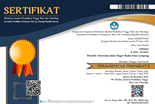Hubungan Persepsi Terhadap Organisasi dan Motif Sosial dengan Minat Berorganisasi
Abstract
I
Interest in organization is the existence of interest from students to participate in and choose to be active in an organization that makes a person have a tendency to pay attention to the activities of the organization he chooses based on encouragement from within. Perceptions of the organization and social motives are factors that influence the occurrence of organizational interest.
This study aims to determine the relationship between perceptions of organization and social motives with organizational interest in the ushuluddin faculty and religious studies. Researchers used quantitative research methods with precision sampling techniques and the samples in this study were 70 students who joined the Study Program Student Association (HMPS). Data collection techniques in this study used a psychological scale including a scale of organizational interest, perception of the organization and social motives. The scale of organizational interest is 21 items (α = 0.905), the perception of the organization is 21 items (α = 0.880), and the social motive is 19 items (α = 0.866). The analysis technique used is a multiple regression analysis technique assisted by the SPSS 21.0 for windows program.
The analyzed data shows the results: The results showed that the value of Rx1.2.3-y = 0.542, the value of F = 13.951 on the significance of p = 0.000 and stated (p < 0.01). The results obtained that the perception of the organization and social motives provide an effective contribution of 29.4% to the dependent variable and 70.6% generated by other variables outside the study. Based on the calculation results obtained the value of rx1-y = 0.459 and p = 0.000 (p <0.05). The results obtained indicate that there is a relationship between perceptions of the organization and interest in the organization. The results obtained stated that the perception variable towards the organization received an effective contribution of 16.7% to the interest in organization. Based on the calculation results obtained the value of rx2-y = 0.418 and p = 0.000 (p <0.05). The results obtained indicate that there is a relationship between social motives and organizational interest. The results obtained stated that the social motive variable received an effective contribution of 12.7% to organizational interest.
Keywords: Interest in Organization, Perception of Organization, and social motives
Full Text:
PDFReferences
Abu, A., & Supriyono, W. (2009). Psikologi Umum. Jakarta: Rieka Cipta.
Al-Quran Terjemahan. 2015. Departemen Agama RI. Bandung: CV Darus Sunnah.
Ardi, M., & Aryani, L. (2010). Hubungan Antara Persepsi Terhadap Organisasi dengan Minat Berorganisasi pada Mahasiswa Fakultas Psikologi UIN Sultan Syarif Kasim Riau. Jurnal Psikologi, 7(2), 1-11.
Ardian, Z. A. E. (2017). Pengaruh dukungan sosial orang tua terhadap minat berorganisasi pada anggota aktif UKM PSM Gema Gita Bahana UIN Maulana Malik Ibrahim Malang (Doctoral dissertation, Universitas Islam Negeri Maulana Malik Ibrahim).
Ardiansyah, A. G. U. N. G. (2016). Pengaruh Uang Kuliah Tunggal (Ukt) terhadap Minat Berorganisasi Mahasiswa Di Lingkungan Jurusan Pendidikan Ilmu Pengetahuan Sosial (P. Ips) Fkip Universitas Lampung Tahun 2015/2016.
Arikunto, S. (2008). Prosedur Penelitian Suatu Pendekatan Praktik. Jakarta: Rineka Cipta
As’ad, M. SU (2008). Psikologi Industri. Surabaya: Penerbit Liberty.
Astuti, E. S. Resminingsih. (2010). Bahan Dasar Untuk Pelayanan Konseling Pada Satuan Pendidikan Menengah Jilid I. Jakarta : PT Grasindo.
Djaali. (2014). Psikologi Pendidikan. Jakarta : Bumi Aksara
Erni & Kurniawan. 2008. Pengantar Manajemen, Jakarta: Prenada Media
Friyani, V. S., Hakim, S. N., & Psi, S. (2018). Hubungan Persepsi Terhadap Organisasi Dengan Minat Mahasiswa Kedokteran Untuk Berorganisasi (Doctoral dissertation, Universitas Muhammadiyah Surakarta).
Hadi, S. (1991). Analisis butir untuk instrumen. Yogyakarta: Andi Offset. Hurlock. (2004). Psikologi Perkembangan. Jakarta: Gramedia Pustaka
Idzhar, A., & Mansyur, A. (2014). Pengaruh Motivasi Sosial Terhadap Prestasi Kerja Pegawai Di Kantor Sekretariat Daerah Kabupaten Bantaeng. Jurnal Ad'ministrare, 1(1), 39-49.
Jefkins, F. (1997). Periklanan. Jakarta: Erlangga
Kartono, K. (1991). Psikologi sosial untuk manajemen perusahaan, dan industri. Raja Grafindo Persada.
Ling, J. (2012). Catling J. Psikologi kognitif. Jakarta: Erlangga.
Mahmud, H. (2011). Metode Penelitian Pendidikan. Bandung: CV Pustaka Setia. Manzoor, B., Saxena, K., & Shahpurwala, Z. (2014). ISPOR Student Interest Survey Results 2013-2014. ISPOR Connections, 20(4).
Miftah, T. (2008). Perilaku dan Organisasi: Konsep Dasar dan Aplikasinya. Jakarta: Raja Grafindo Persada.
Morris.E.K . (2009). Behavior Analysis And Ecological Psychology: Past, Present, And Future, A Review Of Harry Heft's Ecological Psychology In Context. Journal Of The Experimental Analysis Of Behavior, 92(2), 275-304.
Mursidin. (2010). Psikologi Umum. Bandung: Pustaka Setia
Neneng. A & Rifka A. (2006). Motif Sosial dan Kebermaknaan Hidup Remaja Pagar Alam. Jurnal Psikologika. 11(21).1-13
Ningsih, W. S., & Kusmayadi, D. (2008). Hubungan Antara Minat Berorganisasi Dengan Asertifitas Pada Mahasiswa. SOUL: Jurnal Ilmiah Psikologi, 1(2), 73-83.
Nurul. (2011). Ingin Konsen Kuliah, Maru Belum Ingin Berorganisasi. Pabelan-
online.com. http://pabelanonline.com/2011/09/12/ingin-konsen-kuliah-maru- belum-inginberorganisa
Prasetyono, D. S. (2008). Rahasia mengajarkan gemar membaca pada anak sejak dini.
Yogyakarta: Think.
Purwanto, M. N. (2000). Prinsip-prinsip dan teknik evaluasi pengajaran.
Ribeiro, R. (2014). The role of experience in perception. Human Studies, 37(4), 559- 581.
Robbins, Stephen P. (1999). Prinsip-prinsip Perilaku Organisasi Edisi ke 5. Jakarta: Erlangga
Robbins, S. P., & Judge, T. (2012). Essentials of organizational behavior.
Shaleh, Abdul Rahman. (2009). Psikologi Suatu Pengantar Dalam Perspektif Islam.
Jakarta: Kencana
Snyder, J. S., & Weintraub, D. M. (2013). Loss and persistence of implicit memory for sound: Evidence from auditory stream segregation context effects. Attention, Perception, & Psychophysics, 75(5), 1059-1074.
Sobur, A. (2009). Psikologi Umum (cetakan II). Bandung: CV Pustaka Setia.
Suharyat, Y. (2009). Hubungan Antara Sikap, Minat Dan Perilaku Manusia. Jurnal Region, 1 (2), 1-19.
Syam, N. (2012). Psikologi Sosial. Bandung : PT Remaja Rosdakarya
TribunJabar. (2018). Minat mahasiswa terhadap Kesadaran berorganisasi dan berdisukusi kian terkikis. https://jabar.tibunnews.com/2018/08/21/n- berorganisasi-dan-berdiskusi-kian-terkikis-mahasiswa-harus-ikuti- perkembangan-zaman
DOI: http://dx.doi.org/10.24042/ajp.v5i1.13987
Refbacks
- There are currently no refbacks.
Copyright (c) 2022 ANFUSINA: Journal of Psychology











